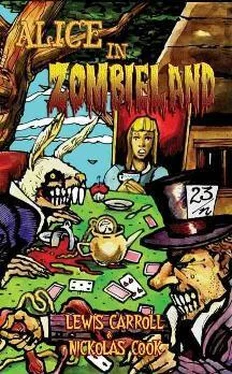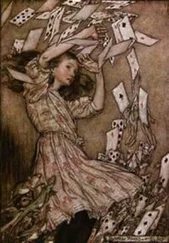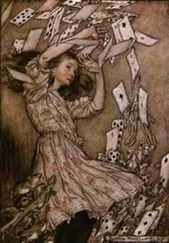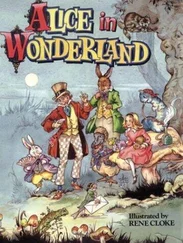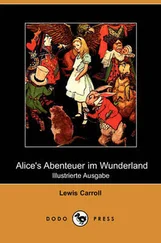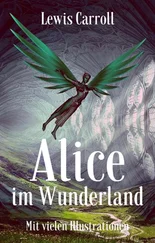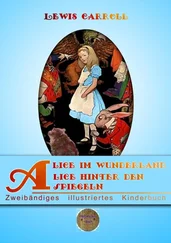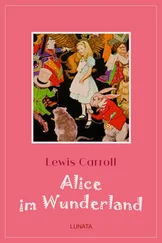Chapter 6 The Tiny Corpse and Pepper
For a minute or two she stood looking at the house, shivering violently, fighting against the enormous and mindless hunger that kept growing inside her, and wondering what to do next, when suddenly a footman in livery came running out of the wood—(she considered him to be a footman because he was in livery: otherwise, judging by his face only, she would have called him a corpse)—and rapped loudly at the door with his torn and bony knuckles. It was opened by another footman in livery, with a round face, and large eyes; and both footmen, Alice noticed, looked pale and not quite alive, and not quite dead either. They both also smelled terrible; she could smell them even from her distant bush. Each of them also wore strange jeweled collars around their necks. And both had powdered hair that curled all over their heads. She felt very curious to know what it was all about, and crept a little way out of the wood to listen.
The arriving Footman gave a snarling grunt and began by producing from under his arm a great letter, nearly as large as himself, stained by dark blood stains and other unthinkable fluids, and this he handed over to the other, saying, in a solemn tone, ‘For the Duchess. An Invitation from the Queen to play croquet.’ The door Footman repeated, in the same solemn tone, only changing the order of the words a little, ‘From the Queen. An invitation for the Duchess to play croquet.’
Then they both bowed low, and their curls got entangled together. And then there was a great tumult of flailing arms and gnashing teeth, and the two footmen were attacking one another, tearing at their powdered wigs and blood stained jackets.
Alice laughed so much at this, that she had to run back into the wood for fear of their hearing her; and when she next peeped out the delivery Footman was gone, and the other was sitting on the ground near the door, staring stupidly up into the sky, licking its bony bloody fingers. Alice didn’t like to think what had happened to the other footman, but she saw no corpse lying about, only one of those odd jeweled collars lying in the dust.
Alice went timidly up to the door, and knocked.
‘There’s no sort of use in knocking,’ said the Footman, still nibbling at his gore-stained fingers, ‘and that for two reasons. First, because I’m on the same side of the door as you are; secondly, because they’re making such a noise inside, no one could possibly hear you.’ And certainly there was a most extraordinary noise going on within—a constant howling and sneezing, and every now and then a great crash, as if a dish or kettle had been broken to pieces.
‘Please, then,’ said Alice, ‘how am I to get in?’
‘There might be some sense in your knocking,’ the Footman went on without attending to her, ‘if we had the door between us. For instance, if you were inside , you might knock, and I could let you out, you know.’ He was looking up into the sky all the time he was speaking, and this Alice thought decidedly uncivil. ‘But perhaps he can’t help it,’ she said to herself; ‘his eyes are so very nearly at the top of his head. But at any rate he might answer questions.—How am I to get in?’ she repeated, aloud.
‘I shall sit here,’ the Footman remarked, ‘till tomorrow—’
At this moment the door of the house opened, and a large plate came skimming out, straight at the Footman’s head: it just grazed his nose, and broke to pieces against one of the trees behind him.
‘—or next day, maybe,’ the Footman continued in the same tone, exactly as if nothing had happened.
‘How am I to get in?’ asked Alice again, in a louder tone.
‘ Are you to get in at all?’ said the Footman. ‘That’s the first question, you know.’
It was, no doubt: only Alice did not like to be told so. ‘It’s really dreadful,’ she muttered to herself, ‘the way all the creatures argue. It’s enough to drive one crazy!’
The Footman seemed to think this a good opportunity for repeating his remark, with variations. ‘I shall sit here,’ he said, ‘on and off, for days and days.’
‘But what am I to do?’ said Alice.
‘Anything you like,’ said the Footman, and began eating his own fingers in great snapping crunches, moaning in ecstasy as he did so.
‘Oh, there’s no use in talking to him,’ said Alice desperately: ‘he’s perfectly idiotic! Eating himself all up! What shall be left in a little while and how will he answer the door without his hands?’ And she opened the door and went in.
The door led right into a large kitchen, which was full of smoke from one end to the other: the Duchess was sitting on a three-legged stool in the middle, nursing a baby; the cook was leaning over the fire, stirring a large cauldron which seemed to be full of soup.
The kitchen was dimly lit by the small fire under the cooking pot. Shadows danced along the walls, which looked wet and dripped with something thick and dark. Small skeletons hung from pegs along the walls. Some belonged to various animals—frogs, cats, dogs, pigs and rabbits, mostly. But there were some that had obviously belonged to small children, and those frightened Alice a great deal. What kind of people had she stumbled across that ate small children?
But Alice’s hunger was getting the best of her again and she leaned towards the cooking pot. The delicious scent wafted to her and her mouth began to water; she peeked into the pot and saw dismembered legs and arms swimming in the dark red liquid. Despite her hunger, her eyes began to water as she bent over the smoking pot. ‘There’s certainly too much pepper in that soup!’ Alice said to herself, as well as she could for sneezing.
There was certainly too much of it in the air. Even the Duchess sneezed occasionally; and as for the baby, it was sneezing and howling alternately without a moment’s pause. The only things in the kitchen that did not sneeze, were the cook, and a skinny black cat which was sitting on the hearth and grinning from ear to ear. The cat was dark with gray and black stripes alternating along its emaciated body. Its thin ribcage showed clearly along its sides, and its whiskers looked mangled and torn. But for all that it looked near dead; two fearfully bright eyes looked back at her over its ragged paws. She wasn’t sure what made her more uncomfortable: its eyes or its alarmingly sinister and toothy grin.
‘Please would you tell me,’ said Alice, a little timidly, for she was not quite sure whether it was good manners for her to speak first, ‘why your cat grins like that?’
‘It’s a Cheshire cat,’ said the Duchess, ‘and that’s why. dead! ’
She said the last word with such sudden violence that Alice quite jumped; but she saw in another moment that it was addressed to the baby, and not to her, so she took courage, and went on again: ‘I didn’t know that Cheshire cats always grinned; in fact, I didn’t know that cats could grin.’
‘They all can,’ said the Duchess; ‘and most of ’em do.’
‘I don’t know of any that do,’ Alice said very politely, feeling quite pleased to have got into a conversation.
‘You don’t know much,’ said the Duchess; ‘and that’s a fact.’
Alice did not at all like the tone of this remark, and thought it would be as well to introduce some other subject of conversation. While she was trying to fix on one, the cook took the cauldron of soup off the fire, and at once set to work throwing everything within her reach at the Duchess and the baby—the fire-irons came first; then followed a shower of saucepans, plates, and dishes and old bones and ragged grave clothes. The Duchess took no notice of them even when they hit her; and the baby was howling so much already, that it was quite impossible to say whether the blows hurt it or not.
Читать дальше
